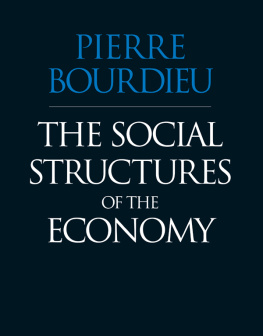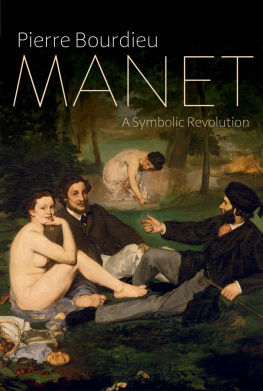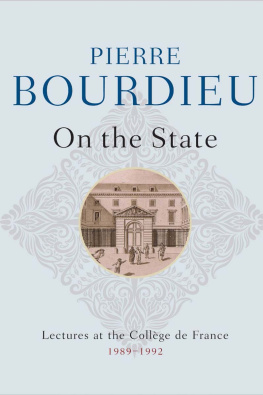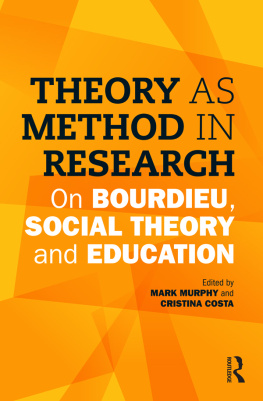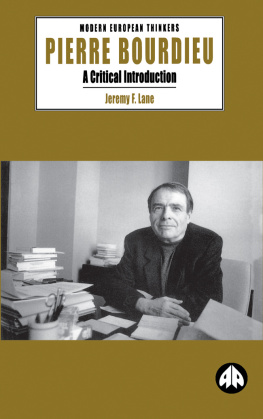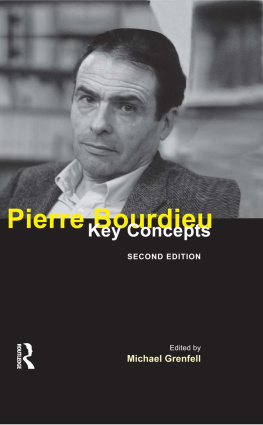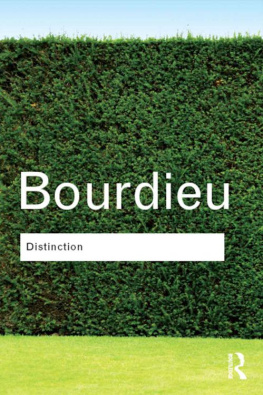Bourdieu Pierre - The Social Structures of the Economy
Here you can read online Bourdieu Pierre - The Social Structures of the Economy full text of the book (entire story) in english for free. Download pdf and epub, get meaning, cover and reviews about this ebook. publisher: Wiley, genre: Politics. Description of the work, (preface) as well as reviews are available. Best literature library LitArk.com created for fans of good reading and offers a wide selection of genres:
Romance novel
Science fiction
Adventure
Detective
Science
History
Home and family
Prose
Art
Politics
Computer
Non-fiction
Religion
Business
Children
Humor
Choose a favorite category and find really read worthwhile books. Enjoy immersion in the world of imagination, feel the emotions of the characters or learn something new for yourself, make an fascinating discovery.
- Book:The Social Structures of the Economy
- Author:
- Publisher:Wiley
- Genre:
- Rating:3 / 5
- Favourites:Add to favourites
- Your mark:
- 60
- 1
- 2
- 3
- 4
- 5
The Social Structures of the Economy: summary, description and annotation
We offer to read an annotation, description, summary or preface (depends on what the author of the book "The Social Structures of the Economy" wrote himself). If you haven't found the necessary information about the book — write in the comments, we will try to find it.
The Social Structures of the Economy — read online for free the complete book (whole text) full work
Below is the text of the book, divided by pages. System saving the place of the last page read, allows you to conveniently read the book "The Social Structures of the Economy" online for free, without having to search again every time where you left off. Put a bookmark, and you can go to the page where you finished reading at any time.
Font size:
Interval:
Bookmark:
For Jrme
The Social Structures of the Economy

PIERRE BOURDIEU
Translated by Chris Turner
polity
Copyright Pierre Bourdieu 2005
The right of Pierre Bourdieu to be identified as Author of this Work has been asserted in accordance with the UK Copyright, Designs and Patents Act 1988.
Every effort has been made to trace all copyright holders, but if any have been inadvertently overlooked the publishers will be pleased to include any necessary credits in any subsequent reprint or edition.
First published in 2005 by Polity Press
Reprinted 2008 (twice)
Polity Press
65 Bridge Street
Cambridge CB2 1UR, UK
Polity Press
350 Main Street
Malden, MA 02148, USA
All rights reserved. Except for the quotation of short passages for the purpose of criticism and review, no part of this publication may be reproduced, stored in a retrieval system, or transmitted, in any form or by any means, electronic, mechanical, photocopying, recording or otherwise, without the prior permission of the publisher.
ISBN: 978-0-7456-2540-9 (pbk)
ISBN: 978-0-7456-2539-3 (hbk)
ISBN: 978-0-7456-8165-8 (ebook)
A catalogue record for this book is available from the British Library.
Typeset in Sabon in 11pt on 12pt
by BookEns Ltd, Royston, Herts.
Printed and bound in the United States by
Odyssey Press Inc., Gonic, New Hampshire
Contents

While economics is about how people make choice, sociology is about how they dont have any choice to make.
Bertrand Russell
Introduction

It takes centuries of culture to produce a utilitarian such as John Stuart Mill.
Henri Bergson
The science called economics is based on an initial act of abstraction that consists in dissociating a particular category of practices, or a particular dimension of all practice, from the social order in which all human practice is immersed. This immersion, some aspects or effects of which one finds in Karl Polanyis notion of embeddedness, obliges us (even when, for the purposes of increasing knowledge, we are forced to treat it otherwise) to conceive every practice, beginning with the practice which presents itself, most obviously and in the strictest sense, as economic, as a total social fact in Marcel Mausss sense.
The individual studies I carried out more than forty years ago in Algeria on the logic of the economy of honour and good faith or on the economic and cultural determinants of practices of saving, credit or investment or, in the mid-1960s with Luc Boltanski and Jean-Claude Chamboredon, on banks and their customers or, more recently, with Salah Bouhedja, Rosine Christin, Claire Givry and Monique de Saint-Martin, on the production and marketing of single-family houses The introduction of these notions is merely one aspect of a more general shift of language (marked, for example, by the substitution of the lexicon of dispositions for the language of decision-making, or of the term reasonable for rational), which is essential to express a view of action radically different from that which most often implicitly underlies neoclassical theory.
In having recourse to concepts that have been developed and applied to objects as diverse as ritual practices, economic behaviours, education, art or literature, I would not wish to appear to be indulging in that kind of reductionist annexationism, ignorant of the specificities and particularities of each social microcosm, to which certain economists are increasingly addicted today, in the conviction that the most general concepts of the most highly refined economic thought are adequate for the analysis, outside of any reference to the work of historians or social anthropologists, of social realities as complex as the family, intergenerational exchanges, corruption or marriage. In fact, I start out with quite the opposite conviction: because the social world is present in its entirety in every economic action, we have to equip ourselves with instruments of knowledge which, far from bracketing out the multidimensionality and multi-functionality of practices, enable us to construct historical models capable of accounting, with rigour and parsimony, for economic actions and institutions as they present themselves to empirical observation. Clearly, this is achieved at the expense of a prior suspension of ones ordinary commitment to the preformed notions and assumptions of common sense. As is shown by so many deductive models produced by economists, which are mere mathematical formalizations and formularizations of a commonsense insight, this break with ordinary practice is perhaps never so difficult as when what is to be questioned, such as the principles underlying economic practices, is inscribed in the most ordinary routines of everyday experience.
I can give an idea of the labour of conversion needed to break with the primal vision of economic practices only by referring to the long string of surprised, astonished and disconcerted reactions that led me to experience quite tangibly the contingent character of so many behaviours which form part of our normal daily round: calculation of cost and profit, lending at interest, saving, credit, the creation of a reserve, investment or even work. I remember spending many an hour peppering with questions a Kabyle peasant who was trying to explain a traditional form of the loan of livestock, because it had not occurred to me that, contrary to all economic reason, the lender might feel an obligation to the borrower on the grounds that the borrower was providing for the upkeep of an animal that would have had to have been fed in any case. I also remember all the tiny anecdotal observations or statistical findings I had to put together before gradually realizing that I, like everyone else, had an implicit philosophy of work, based on an equivalence between work and money: the behaviour, deemed highly scandalous, of the mason who, after a long stay in France, asked that a sum corresponding to the cost of the meal laid on for the workers at the end of the job a meal he had refused to attend should be added to his wages or the fact that, despite working an objectively identical number of hours or days, the peasants of the southern regions of Algeria, where emigration has had less of an impact, were more likely to say they And I can also remember feeling a kind of amused stupefaction at the extraordinary story of the children of Lowestoft in Norfolk, England, who, as the French newspapers of 29 October 1959 reported, had set up a scheme of insurance against punishment which meant that for a beating the insured party received four shillings and who, in response to attempts to abuse the system, had gone so far as to add a supplementary clause to the effect that no payment would be made to those incurring punishment deliberately.
Since they lacked these predispositions, which the spontaneously Millian schoolchildren of Lowestoft had imbibed with their mothers milk, the economic agents I was able to observe in Algeria in the 1960s had to learn or, more exactly, reinvent, with greater or lesser success depending on their economic and cultural resources, everything economic theory considers (at least tacitly) as a given, that is to say, everything it regards as an innate, universal gift, forming part of human nature: the idea of work as an activity procuring a monetary income, as opposed to mere occupation on the lines of the traditional division of activities or the traditional exchange of services; the very possibility of impersonal transactions between strangers, linked to a market situation, as opposed to all the exchanges of the economy of good faith, as the Kabyles call it, between relatives and acquaintances or between strangers, but strangers domesticated, so to speak, by the provision of guarantees from close relations and intermediaries capable of limiting and averting the risks associated with the market; the notion of long-term investment, as opposed to the practice of putting in reserve, or the simple anticipation that forms part of the directly felt unity of productive cycles; the modern conception, which has become so familiar to us that we forget that it once gave rise to interminable ethical and legal debates, of lending at interest and the very idea of a contract, with its previously unknown strict deadlines and formal clauses, which gradually supplanted the honourable exchange between men of honour that excluded calculation and the pursuit of profit, and involved an acute concern with fairness etc. These are all so many partial innovations, but together they form a system because they are rooted in a representation of the future as a site of possibles that are open and susceptible to calculation.
Next pageFont size:
Interval:
Bookmark:
Similar books «The Social Structures of the Economy»
Look at similar books to The Social Structures of the Economy. We have selected literature similar in name and meaning in the hope of providing readers with more options to find new, interesting, not yet read works.
Discussion, reviews of the book The Social Structures of the Economy and just readers' own opinions. Leave your comments, write what you think about the work, its meaning or the main characters. Specify what exactly you liked and what you didn't like, and why you think so.

